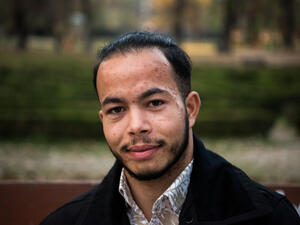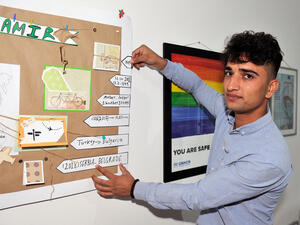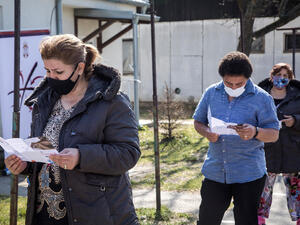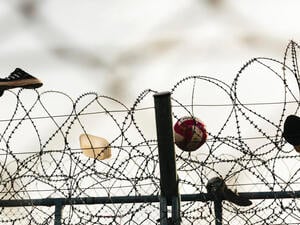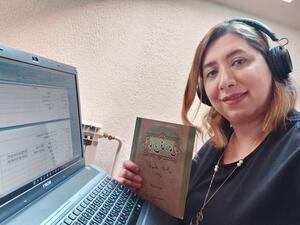Kosovo Crisis Update
Kosovo Crisis Update
Returns
Nearly 90 percent of the over 850,000 ethnic Albanians who fled Kosovo during the war have returned to the Serbian province.
Around 715,000 have gone back from neighbouring territories to Kosovo. A further 30,800 have returned to Kosovo from third countries, through the FYR of Macedonia or directly by air to Kosovo. This number includes both spontaneous returns as well as those organized by UNHCR/IOM.
In the first direct flight of returnees to Kosovo from abroad, IOM organized a flight from Switzerland on 2 August. An Estonian Tupolev plane ferried 167 Kosovar refugees from Zurich to Pristina.
Bernard Kouchner, the UN Secretary-General's Special Representative in Kosovo, welcomed the arrivals, who were later taken by bus to Prizren, Djakovica, Pec, Pristina, Mitrovica, Urosevac and Gnjilane.
Another flight from Oslo is scheduled to arrive Wednesday in Pristina under the UNHCR-IOM voluntary repatriation programme.
UNHCR staff in Tirana report that there is a parallel movement of Kosovars from other European countries travelling to Kosovo through Albania. This includes both refugees returning definitively and Kosovars who reside in other countries but who are returning for visits and to help their relatives rebuild. The UNHCR office in Albania reports that between 19 July and 3 August, 3,800 refugees repatriated spontaneously from abroad through Albania. Several thousand other Kosovars travelled to Kosovo via Albania during the same period for short visits.
FYR of Macedonia
UNHCR is extremely concerned at problems arising from the imposition of a 640 DM customs inspection fee on all goods transiting the FYR of Macedonia.
The fee, which was announced on 15 July by the Skopje government, has brought the aid pipeline to a halt and is contributing to a huge backup of supplies.
UNHCR believes the 640 DM fee is disproportionate and penalizes humanitarian agencies trying to provide assistance to Kosovo. Initially the regulation applied only to trucks inspected at the Blace border crossing, but on 23 July the authorities made clear that it would apply retroactively to all trucks carrying transit cargo, including those which were inspected in Skopje.
There are currently 86 trucks carrying UNHCR supplies backed up in a parking lot in Skopje, loaded with around 3,440 metric tons of aid. Also held up are dozens of trucks carrying supplies of other UN agencies and NGOs and 17 rail wagons carrying some 850 metric tons of timber for UNHCR's shelter programme. These supplies are needed now to ensure that hundreds of thousands of people are able to repair their homes before the arrival of winter. Over the next 10 days, another 28 rail wagons carrying timber are expected to arrive in the FYR of Macedonia.
Prior to the imposition of the fee, UNHCR alone had been sending an average of 20-25 trucks a day across the Blace border into Kosovo. Many more were dispatched by other agencies.
Meanwhile, UNHCR is making arrangements for the repair of at least four collective centres in the FYR of Macedonia for use during the winter. UNHCR and its NGO partners are looking at ways of assisting families which are continuing to host refugees. Five out of the original eight camps in the country have been closed. Three remain operational: Cegrane and Neprosteno (for Kosovo Albanians) and Stenkovec II, temporarily accommodating Roma refugees.
Rehabilitation of former camp sites is proceeding apace. The closed sites at Blace, Stenkovec I, Radusa and Bojane have been cleaned. Senokos is in the process of being cleaned and its borehole water supply connected to the village. CARE has presented its comprehensive plan for conversion of Cegrane into a vineyard.
There is a steady trickle of new arrivals, mostly claiming to be ethnic Albanians from the Presevo and Bujanovac areas of southern Serbia. Some Roma arrivals are also still reported.
Kosovo
UNHCR is providing assistance for the rebuilding of the Kosovo Albanian charity Mother Teresa Society, its main partner in the secondary distribution of relief goods.
MTS activities ground to a halt during the final stages of the Kosovo conflict, but officials now say that most of its 8,000 volunteers are back at work. Of the 44 branches in the province before the NATO action in March, 38 have reopened for business, along with 500 of its 636 sub-branches.
UNHCR and other aid agencies send supplies from seven major distribution centres to MTS warehouses. These supplies then are distributed by volunteers in the outlying villages.
UNHCR is providing assistance to pockets of non-Albanians scattered throughout Kosovo.
In Orahovac, south-west of Pristina, UNHCR is sending relief aid to some 3,000 Serbs in the northern part of the town. Half of the number were forced to flee after they were attacked by returning ethnic Albanians in other parts of the town and in the villages of Velika Hoca and Zociste.
UNHCR is also closely monitoring the situation of some 500 Roma people in 72 families encamped near a cemetery in the Djakovica area. During a recent visit to the area, unknown men riding in a car snatched a Roma man in broad daylight, despite the presence of KFOR troops guarding the area.
KFOR authorities report 67 cases of harassment, beatings and kidnappings of Roma in the Djakovica-Orahovac areas.
Tension also continues in Gnjilane, where there is a substantial Serb community. In a recent incident, two Serbs were killed at the mixed village of Zitinje just outside Gnjilane.
A 9 p.m. to 3:30 a.m. curfew remains in Gnjilane, where incidents of arson, looting and expulsions committed against some 4,000 Serb and 400 Roma residents are reported during the night.
Albania
As the number of Kosovar repatriants and visitors from abroad passing through Albania increases, UNHCR is seeking assistance from the Albanian government to secure the roads to the Kosovo border.
Most of the returnees and visitors from abroad are arriving with their cars through the western port city of Durres and proceed to the northern border town of Kukes for the onward journey to homes in Kosovo.
UNHCR has called the attention of Albanian officials to reports of extortion and robbery against the Kosovar travelling in cars across Albania.
UNHCR has produced an information brochure for these travellers for distribution to them on arrival in Durres, with information on the safest routes to the border and advising them to travel in groups.
Concert Contribution
The German government has handed over to UNHCR a check for 260,000 DM representing the proceeds of a concert by the Cologne Philharmonic Orchestra at the G8 summit in Germany on 19 June. The money will be used to help Kosovar refugees and returnees.
During the concert in Cologne, dedicated to refugees in the Balkans, German Chancellor Gerhard Schroeder thanked UN High Commissioner for Refugees Sadako Ogata for her organization's "ceaseless efforts" on behalf of the world's refugees.



